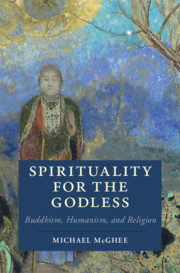Book contents
- Spirituality for the Godless
- Cambridge Studies in Religion, Philosophy, and Society
- Spirituality for the Godless
- Copyright page
- Dedication
- Epigraph
- Contents
- Acknowledgements
- A Shakespearean Prologue
- Introduction
- 1 ‘A Spiritually Enlightened Individual’
- 2 ‘The Resources of a Much Earlier Phase of the Tradition’
- 3 The Distractions of Baruch Spinoza
- 4 Immanuel Kant: ‘To Regard as Petty What We Are Otherwise Anxious About’
- 5 Wittgenstein’s Cool Temple
- 6 Rilke, Shakespeare … and a Little Freud
- 7 Concealment and Revelation
- 8 Mindfulness and the Form of a Philosophical Life
- 9 Epictetus: ‘The Beginning of Philosophy …’
- 10 Ted Hughes: Evaporation, Translation, Translocation
- 11 Philosophy as an Inventive Convergence of Methods
- 12 Richard Norman: ‘The Truths It Contains Are Human Truths’
- 13 Perspectives: Marmalade Stains on the Breakfast Table
- 14 David Hume: Wanting the Natural Sentiments of Humanity
- 15 ‘What is the Difference between Love and God’s Love?’
- 16 ‘Peace, Wild Wooddove, Shy Wings Shut’
- 17 ‘Only a Little Snivelling Half-Wit Can Maintain That’
- 18 ‘The World Is Too Much with Us’
- 19 Of Self and SELF, of Ātman and Anātman
- 20 ‘I Am Myself Alone’
- 21 The Five Heaps or Skandhas
- 22 ‘We Claim That There Is a Person, but We Do Not Say That He Is an Entity’
- 23 Birds, Frogs, and Tintern Abbey
- 24 Human Resources and Hubris
- References
- Index
13 - Perspectives: Marmalade Stains on the Breakfast Table
Published online by Cambridge University Press: 18 June 2021
- Spirituality for the Godless
- Cambridge Studies in Religion, Philosophy, and Society
- Spirituality for the Godless
- Copyright page
- Dedication
- Epigraph
- Contents
- Acknowledgements
- A Shakespearean Prologue
- Introduction
- 1 ‘A Spiritually Enlightened Individual’
- 2 ‘The Resources of a Much Earlier Phase of the Tradition’
- 3 The Distractions of Baruch Spinoza
- 4 Immanuel Kant: ‘To Regard as Petty What We Are Otherwise Anxious About’
- 5 Wittgenstein’s Cool Temple
- 6 Rilke, Shakespeare … and a Little Freud
- 7 Concealment and Revelation
- 8 Mindfulness and the Form of a Philosophical Life
- 9 Epictetus: ‘The Beginning of Philosophy …’
- 10 Ted Hughes: Evaporation, Translation, Translocation
- 11 Philosophy as an Inventive Convergence of Methods
- 12 Richard Norman: ‘The Truths It Contains Are Human Truths’
- 13 Perspectives: Marmalade Stains on the Breakfast Table
- 14 David Hume: Wanting the Natural Sentiments of Humanity
- 15 ‘What is the Difference between Love and God’s Love?’
- 16 ‘Peace, Wild Wooddove, Shy Wings Shut’
- 17 ‘Only a Little Snivelling Half-Wit Can Maintain That’
- 18 ‘The World Is Too Much with Us’
- 19 Of Self and SELF, of Ātman and Anātman
- 20 ‘I Am Myself Alone’
- 21 The Five Heaps or Skandhas
- 22 ‘We Claim That There Is a Person, but We Do Not Say That He Is an Entity’
- 23 Birds, Frogs, and Tintern Abbey
- 24 Human Resources and Hubris
- References
- Index
Summary
One of the attractions of Buddhism for former theists is the salience of its images of liberation – the serenity of the Buddha figure, the representation of self-possession and calm; a compassion founded in some kind of knowledge unavailable to the rest of us. It is a dangerous attraction, because it can prompt a facile imitation, a too-precipitate and self-regarding appropriation of a demeanour that, if it is a genuine possibility, comes only after struggle, and doesn’t pre-empt it. It is precisely not the demeanour of Prince Siddhartha as he notices the mendicant disappearing into the forest – an image of a possible resolution of conflict that had then to be explored and tested, a process, however, that is presented in the literature as successful – and thus presenting us with the existential necessity for the critical scrutiny of a claim to truth, something ‘worthy of questioning’.
- Type
- Chapter
- Information
- Spirituality for the GodlessBuddhism, Humanism, and Religion, pp. 85 - 89Publisher: Cambridge University PressPrint publication year: 2021

